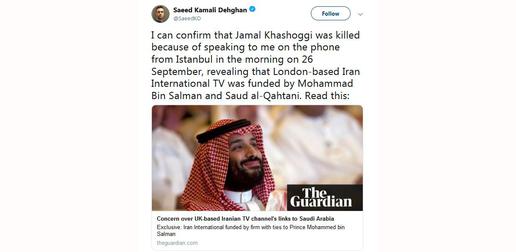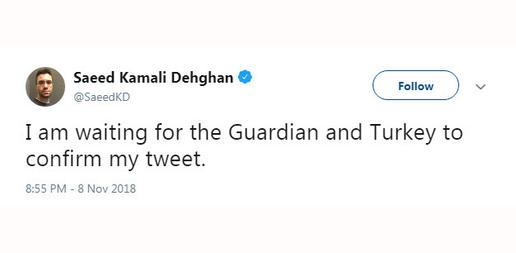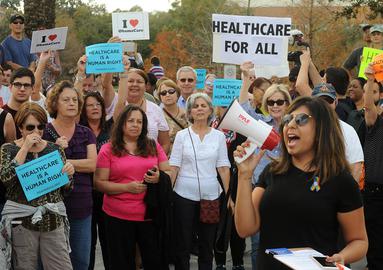At 3am on Friday, November 9, a Guardian reporter claimed on Twitter that the reason Jamal Khashoggi was murdered was that the slain Saudi journalist told him that a London-based Iranian satellite channel was funded by Saudi Arabia. Saeed Kamali-Dehghan, who is also based in London, then chastised the Saudi king by quoting the Koran, expressed love for his mother and asked his friends and family not to contact him. All tweets were deleted a few hours later. The Guardian has told IranWire that Kamali-Dehghan is fine and that it will release a written statement about the journalist’s tweets soon.
London is the world capital of many things and this includes Middle Eastern dissident journalism. Many an Arab newspaper has long been based in the city and over the last decade, a mushrooming number of Persian TV stations have broadcast out of the British capital. The first major one was BBC Persian, which launched its TV station in 2009. A few years later, it was joined by Manoto TV, an entertainment-focused channel with unknown sources of funding that quickly became popular. Last year, a new broadcasting giant joined the fray: The news-focused Iran International. The new channel is funded by Saudi Arabia, which has been engaged in a cold war with Iran for years.
Iran International is registered under a London company that can be easily traced to Abdurahman al-Rashed, a well-known Saudi journalist and a former editor-chief of one of the best-known Arab newspapers, Asharq al-Awsat, which is also based in London. Al-Rashed was also the general manager of Al-Arabiya, the TV channel that was regarded as a Saudi response to Qatar’s Al-Jazeera. Iran International employees’ salaries are much higher than any of its rivals in London. This means that it has been able to recruit some of the best Iranian journalists in exile.
The channel caused controversy last June when it broadcasted a gathering of the Mojahedin-e Khalq (MEK) organization near Paris. Many Iranians regard the MEK as a cult with a history of dabbling in Marxism and Islamism. The MEK started as a guerilla group in the 1960s and it assassinated many Iranian officials and foreign delegates, including US military advisors in Iran, in the 1970s. The group is widely despised in Iran because they allied themselves with Saddam Hussein during its war with Iran in the 1980s. The United States and many European countries once deemed MEK members to be terrorists, but following the MEK’s extensive global lobby work, it managed to have its “terrorist status” lifted in 2012.
A few months after the gathering, another decision at the channel proved controversial. On September 22, hours after a terrorist attack in the southwestern city of Ahvaz that led to death of soldiers and children, the channel’s presenter welcomed and interviewed the spokesperson of an Arab separatist group that claimed credit for the attack. In its defense, the channel said that other outlets had also interviewed the spokesperson.
On October 2, Kamali Dehghan claimed a source with connections to the Saudi royalty had told him that Saudi crown prince Mohammad bin Salman was personally behind the channel and provided what he claimed was a £250 million budget for its launch. The report was published on the same day Saudi journalist Jamal Khashoggi went missing in Saudi Arabia’s consulate in Istanbul, and the news of his gruesome murder there was soon to captivate the world media. Kamali Dehghan followed up with another piece that linked the channel not only to Bin Salman but to Saud al-Qahtani, a media advisor to the Saudi court who reputedly had a leading role in the interrogation and murder of Khashoggi.
In several tweets Kamali Dehghan implied that there was a link between the Guardian reports and the killing of Khashoggi. Many people active in the Iranian Twittersphere asked: Was there a link?
Hessamedin Ashena, a cabinet-level advisor to Iran’s President Hassan Rouhani, publicly asked on his Twitter account: Was Khashoggi the source that had given the information to Saeed Kamali Dehghan? And why won’t he reveal it? This was echoed by Iran’s ambassador to the UK, Hamid Baedinejad, who had complained to the UK regulators after the channel aired the post-attack interview in September. The conspiratorial nature of the claim made sure it spread quickly, and in the early hours of November 9, Kamali Dehghan, who had shortly before said “he couldn’t confirm or deny” the allegation, wrote the following tweet: “I can confirm that Jamal Khasshogi was killed because of speaking to me on the phone from Istanbul in the morning of September 26, revealing that London-based Iran International TV was funded by MBS and Saud al-Qahtani.”
More Unanswered Questions
The allegation sounded strange. The Saudi funding of Iran International was well known and could be easily found on the UK’s Companies House website. Would the Saudis really go to the length of murdering Khashoggi just because he revealed the court connection to the Persian channel? And how was Kamali Dehghan sure that it was because of this leak that the journalist got killed? Journalists were getting ready to ask questions of their colleague who had made the claim in the wee hours of the morning. But then the tweet was quickly followed by a string of strange additional tweets. First, he repeatedly asked “the Guardian and Turkey” to confirm his claims. Then came a string of tweets quoting verses from the Koran, in their original Arabic, and a few in Persian translation.
“Don’t they know that whatever they hide and whatever they reveal, God knows already?” one asked.
A more obviously-pointed was Verse 2:72: “And [recall] when you slew a man and disputed over it, but Allah was to bring out that which you were concealing.”
Another tweet addressed Saudi King Salman directly with a verse from the Koran: “And they followed [instead] what the devils had recited during the reign of Solomon. It was not Solomon who disbelieved, but the devils disbelieved, teaching people magic.”
The strangest tweet of all addressed Kamali Dehghan’s mother: “My dear mother, Mother Mahin, I love you. Your prayer worked. Take refuge in God. I will see your beautiful face again. Have no doubt. Read the Koran. I will see you. Don’t have any doubts in the verses of God. You are forgiven, just like I was forgiven. Kisses.”
Kamali Dehghan finally asked all his friends and family, except for his mother and “very trusted one[s],” to not contact him.
He also claimed that he had been contacted by Iran International’s lawyers to retract his claims against the channel.
Much discussion continued on Twitter, but just when the sun was coming up in London and most journalists were getting out of their bed, all tweets were all deleted.
A journalist at Guardian’s news desk told IranWire on November 9 that Saeed Kamali Dehghan’s editor had spoken to him and that he was “absolutely fine.” The Guardian’s press office told IranWire it will respond in writing to the question of whether it will confirm or deny the claim that Khashoggi was the source behind the Guardian article. At the time of writing, it still hasn’t.
visit the accountability section
In this section of Iran Wire, you can contact the officials and launch your campaign for various problems



























comments